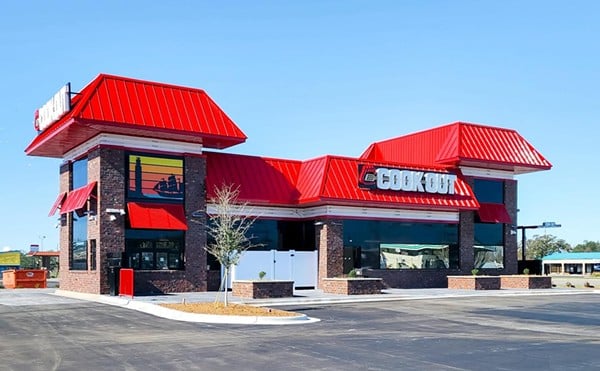Over the last decade, Louisville’s job market has been bleeding.
From January 2000 to January 2010, the Bureau of Labor and Statistics shows the city shed 34,600 private sectors jobs. Those losses represent a 5.5 percent decrease that was under way before the recession of 2008 nearly tanked the
nation’s economy.
Beyond depressing job statistics, there is Louisville’s inclusion on several “worst of”-type lists — sixth dumbest city; fifth worst place to find a job; worst place for allergies; et al. — that make you wonder, Just what is possible in Possibility City?
So what has Greater Louisville Inc. — the city’s chamber of commerce — done to buck this trend? According to
critics: nothing.
“Nobody wants to address this, including the Kentucky chamber of commerce and GLI,” says Bill Stone, owner of Louisville Plate Glass and member of GLI’s governmental affairs steering committee. “I think they’re concerned about pissing off the existing office holders who may get re-elected or stick around, and that is the problem. In order for a chamber of commerce … to be successful, there has to be a level of adversarial relationship with government. They have no adversarial relationship with government. None.”
Like many other business leaders, Stone thinks GLI fails to pursue pro-business policies because of perceived political pressure emanating from the Mayor’s Office and Metro Council, because both branches have the power to alter GLI’s budget.
Additionally, they think GLI’s failure to lobby for specific legislation and regulatory changes — a decrease or abolition of the state’s personal income tax coupled with an increase in sales tax (á la Tennessee); lower workers’ compensation payouts (á la Indiana); improvements in the public school system; improving public transportation, and others — exhibit an unwillingness to challenge the Democratic establishment.
“I think GLI is concerned that what they’ll do will upset the Mayor’s Office,” Stone continues. “And I think that’s more of a GLI perception than any desire of the Mayor’s Office. But I think their board is very concerned, their executives are very concerned to not upset the city, because if they do, then they will receive less money and the labor unions will be angry.”
Chad Carlton, a spokesman for Mayor Jerry Abramson, dismisses the criticism.
“Louisville had a higher percentage of a manufacturing base than other cities,” Carlton says. “Those other cities had already lost their manufacturing base. We were still holding on to our base. Remember, manufacturing took a disproportionate hit during the recession. As a result, we lost more than our competitors.”
Economic data published by Business First paints an even bleaker picture than federal statistics show. In an April 8 article, the paper reported that Louisville lost 40,800 private sector jobs between 2000-2010, pushing the percentage of jobs lost to 7.63, while Nashville and Indianapolis gained 48,000 and 45,000 jobs, respectively.
These statistics dovetail with the results of a report conducted by the University of Cincinnati and Northern Kentucky University. Dubbed “The Regional Indicator Report,” the study examined 15 different economic criteria including quality of life and educational attainment across 12 cities. The report ranked Louisville dead last, below Cincinnati (10th) and Cleveland (11th), whose toxic Lake Erie shores actually manage to draw tourists.
Rich Gimmel, owner of Atlas Machine & Supply, thinks Metro government — including the mayor’s economic development cabinet — and its influence over the chamber of commerce are responsible for the cumulative job losses. Like Stone, he describes a lethargic entity that waits for instruction rather than jumps at opportunities.
“I think there are some people in government in Frankfort and at Metro Hall that are not particularly tuned in to how jobs are created,” Gimmel says. “And businesses, particularly in Jefferson County, are faced with an unduly burdensome set of regulations that tend to stifle job growth. When I was on the board, GLI received $1.25 million from Metro government. The fear then was that the people that run GLI were extremely worried about losing that money, and that sometimes they would pull their punches. I’m not sure that happened all of the time, but I think that it certainly did in a couple of cases.”
There is a larger problem outside the mayor’s purview that business leaders cite as a handicap, Gimmel says: the city’s lagging public education system.
“I’m presently in the process of trying to relocate other people in other states to Jefferson County,” he says. “And in each case, the realtor that they’ve been dealing with has told them ‘stay away from Jefferson County Public Schools, if you can.’”
The lack of educational attainment is “an admitted problem that we’ve been trying to address,” GLI spokeswoman Carmen Hickerson says.
“We have a contract with the city to provide specific business attraction services and expansion services,” Hickerson says. “So we work with businesses that are looking to expand and we work attracting new businesses to the city in certain industries. As such, we have very specific goals each year and we’re held accountable to meet those goals in the specific areas that we work. We have met those goals every year, over the last 10 years, with the exception of last year, which we all know what happened to the economy last year.”
Hickerson further dismisses claims that GLI is subject to any political intimidation by pointing out that a small percentage of its budget comes from Metro government, with the rest coming from membership dues, grants and fundraising.
Data culled from the chamber’s latest available tax information shows that of $8.3 million in total expenditures in 2009, $3.5 million was spent on “employee salaries, other compensation and employee benefits,” a ratio (42 percent) that Hickerson says is normal for the nonprofit sector.
Looking to Louisville’s future, former GLI chairman Jonathan Blue says the next mayor must make job attraction “a priority, every day for the next four years, period,” and that the grim economic numbers don’t lie. “We do not get companies relocating here by waiting for the phone to ring.”





